We may earn a commission if you make a purchase through the links on our website.
Zabbix vs Nagios Comparison, Which is Better for Network Monitoring?
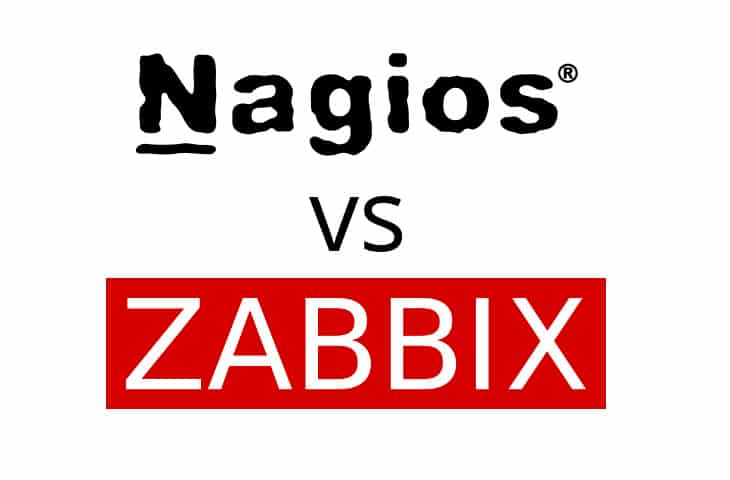
UPDATED: March 31, 2023
When looking for a complete comparison of the differences between Zabbix vs Nagios, there are some basic functions that we need to take into account and understand why they are necessary for a network monitoring solution.
Both of these Programs have FREE (Open-Source) versions available to Download and Install in Your networks. This makes them less of a burden on the end-user and really cuts down on costs when looking for a free NMS.
Both Zabbix and Nagios have fairly extensive features and rely on config files to keep them configured and updated – If you're not shy with editing config files and manually uploading plugins and such, then these might be suitable for your situation.
Here are some screenshots of each product to get a better understanding of their User Interfaces and how they are laid out:
Zabbix:
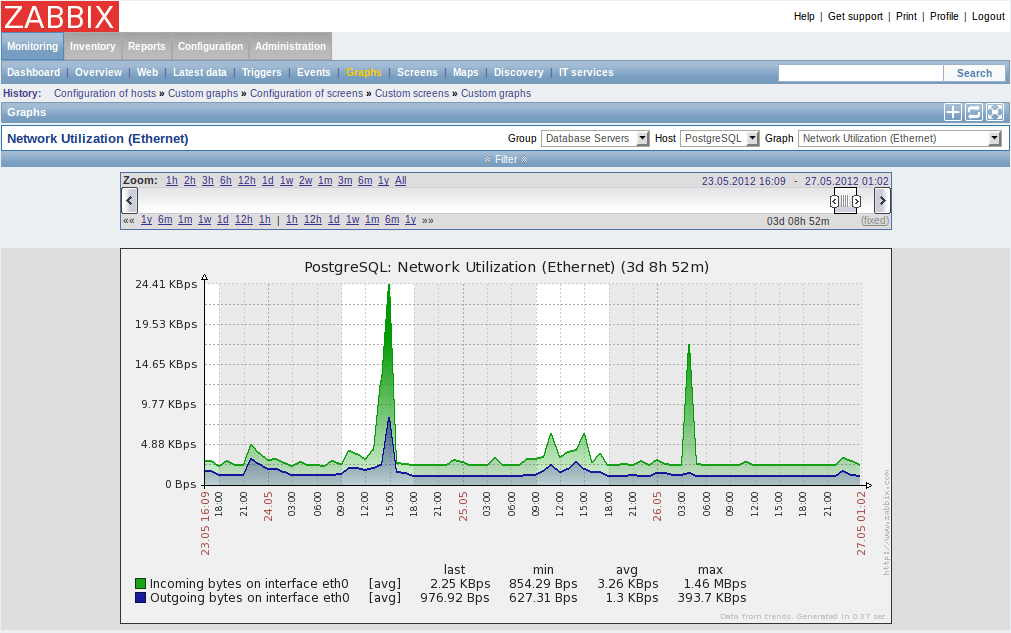
Pros:
- Open-source transparent tool
- Uses both SNMP and ICMP for a broader monitoring range
- Can detect new devices and configuration changes immediately
- Offers useful templates for quick insights
- Robust notification system supports SMS, email, custom script, and webhook
Cons:
- The interface isn’t as intuitive as solutions such as DataDog or Site24x7
- Would like to see better-alerting features, specifically related to reducing false positives
Nagios
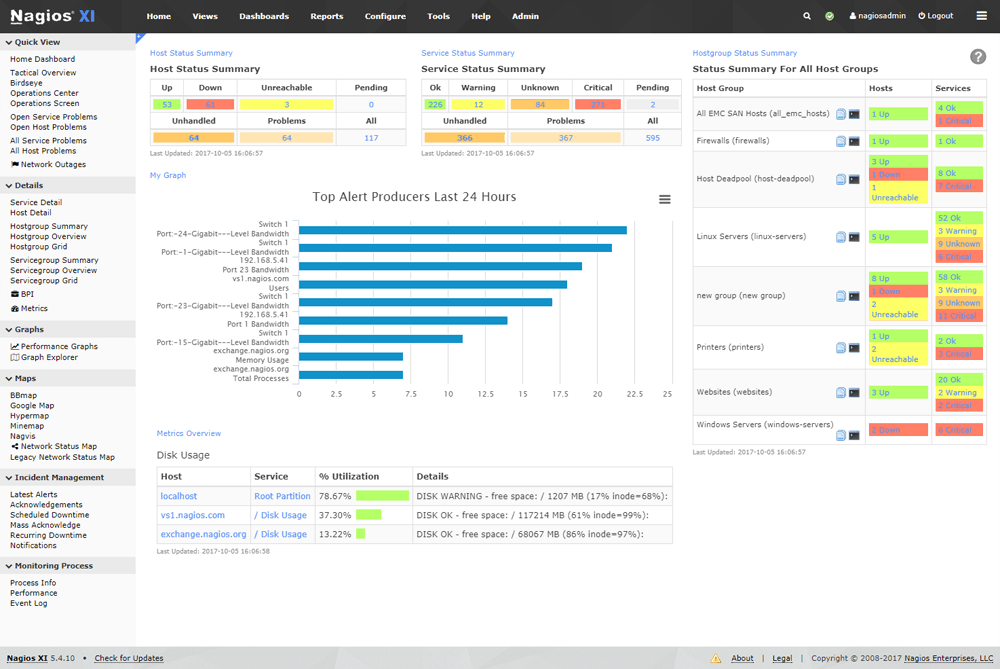
Pros:
- Open-source transparent tool
- Simple, yet informative interface
- Flexible alerting options support SMS and email
- Robust API backend makes it a great option for developers who want to integrate their own custom applications
- Very generous two-month trial period
Cons:
- Open-source version lacks quality support found in paid products
- Installation can be technical and complex
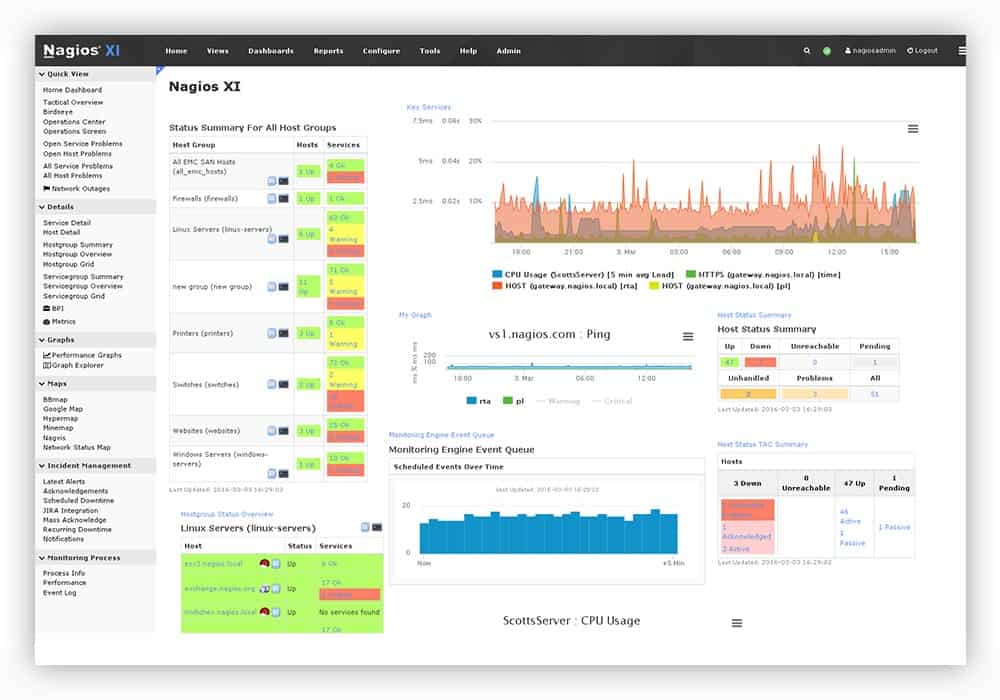
Here is a Comparison of the Zabbix vs Nagios:
| Zabbix | Nagios | |
|---|---|---|
| Protocol Monitoring: (HTTP, FTP, SSH, POP3, SMTP, SNMP, MySQL) |
Yes | Yes |
| Alerting/Notifications : | Yes | Yes |
| Web/Mobile Interface: | Yes | Yes |
| Auto-Discovery and Topology: | No | Yes |
| Wizard Setup: | No | Yes |
| Per-User Views: | No | Yes |
| Network/Custom Maps: | No | Yes |
| Advanced Web Config Wizards: | No | Yes |
| Import Active Directory Information: | Yes | Yes |
| LDAP Information Imports | Yes | Yes |
| Advanced Performance Graphs/Charts: | No | Yes |
| Time Graphs: | Yes | Yes |
| Export Data: | Yes | Yes |
| Advanced/Custom Reports | Yes | Yes |
| Bandwidth and Executive Summary Reports: | via API | Yes |
| Agent/Agentless Monitoring | Yes | Yes |
| Multi-tenant/Distributed Monitoring: | Yes | Yes |
| Native Solaris and Oracle Extensions: | No | Yes |
| Flapping Detection: | No | Yes |
| Commercial Support: | Yes | Yes |
| Comprehensive Documentation | No | Yes |
| Visit Website | Visit Website |
As you can see from the table above, Zabbix doesn't have nearly the amount of features and outright support as Nagios does, and at times, documentation can sometimes be a little spotty and outdated. Many of the questions from the above table were answered throughout their forums or simply where available in their documentation.
One of the major features that we've used in network environments that many admins are looking for is automatic network discovery and topology. Zabbix definitely lacks in that area and we all know that networks evolve daily with the rise of BYOD cultures starting to make their way into every business.
Nagios definitely comes out the clear winner in this comparison guide, as they offer a very good support and some advanced features that Zabbix has not yet been able to offer.
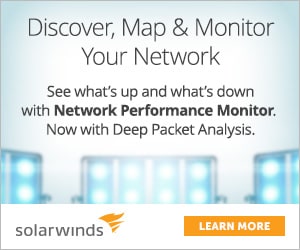 Zabbix vs Nagios FAQs
Zabbix vs Nagios FAQs
What are the key features of Zabbix?
The key features of Zabbix include real-time data collection, a powerful query language, alerting and notification capabilities, and scalability.
What are the key features of Nagios?
The key features of Nagios include real-time data collection, alerting and notification capabilities, and support for a wide range of monitoring plugins.
What are the benefits of using Zabbix?
The benefits of using Zabbix include its open-source nature, scalability, and powerful query language, which allows for efficient data analysis and alerting.
What are the benefits of using Nagios?
The benefits of using Nagios include its open-source nature, support for a wide range of monitoring plugins, and its ability to monitor IT infrastructure, including servers, applications, and network devices.
How does Zabbix compare to Nagios?
Zabbix and Nagios are both open-source monitoring solutions, but Zabbix provides a more comprehensive solution, with a focus on real-time data collection and analysis, while Nagios focuses on monitoring IT infrastructure and provides a wider range of monitoring plugins.
